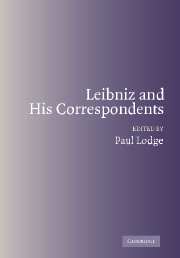Book contents
- Frontmatter
- Contents
- Contributors
- Abbreviations
- Acknowledgments
- 1 Introduction
- 2 Leibniz and His Master: The Correspondence with Jakob Thomasius
- 3 A Philosophical Apprenticeship: Leibniz's Correspondence with the Secretary of the Royal Society, Henry Oldenburg
- 4 The Leibniz–Foucher Alliance and Its Philosophical Bases
- 5 Leibniz to Arnauld: Platonic and Aristotelian Themes on Matter and Corporeal Substance
- 6 Leibniz and Fardella: Body, Substance, and Idealism
- 7 Leibniz's Exchange with the Jesuits in China
- 8 Leibniz's Close Encounter with Cartesianism in the Correspondence with De Volder
- 9 “All the time and everywhere everything's the same as here”: The Principle of Uniformity in the Correspondence Between Leibniz and Lady Masham
- 10 Idealism Declined: Leibniz and Christian Wolff
- 11 On Substance and Relations in Leibniz's Correspondence with Des Bosses
- 12 “[…] et je serai tousjours la même pour vous”: Personal, Political, and Philosophical Dimensions of the Leibniz–Caroline Correspondence
- References
- Index
6 - Leibniz and Fardella: Body, Substance, and Idealism
Published online by Cambridge University Press: 02 September 2009
- Frontmatter
- Contents
- Contributors
- Abbreviations
- Acknowledgments
- 1 Introduction
- 2 Leibniz and His Master: The Correspondence with Jakob Thomasius
- 3 A Philosophical Apprenticeship: Leibniz's Correspondence with the Secretary of the Royal Society, Henry Oldenburg
- 4 The Leibniz–Foucher Alliance and Its Philosophical Bases
- 5 Leibniz to Arnauld: Platonic and Aristotelian Themes on Matter and Corporeal Substance
- 6 Leibniz and Fardella: Body, Substance, and Idealism
- 7 Leibniz's Exchange with the Jesuits in China
- 8 Leibniz's Close Encounter with Cartesianism in the Correspondence with De Volder
- 9 “All the time and everywhere everything's the same as here”: The Principle of Uniformity in the Correspondence Between Leibniz and Lady Masham
- 10 Idealism Declined: Leibniz and Christian Wolff
- 11 On Substance and Relations in Leibniz's Correspondence with Des Bosses
- 12 “[…] et je serai tousjours la même pour vous”: Personal, Political, and Philosophical Dimensions of the Leibniz–Caroline Correspondence
- References
- Index
Summary
In the last number of years, there has been a remarkable interest in Leibniz's account of the physical world, and, in particular, his account of corporeal substance. Much of the discussion has focused around the question of Leibniz's idealism. In particular, the question has been whether even in the so-called middle period, the 1680s and 1690s, when discussions of corporeal substance seem to be most visible, Leibniz's position included the same kind of idealism with respect to the physical world that occupied him in his later, more obviously monadological, writings, or whether he understood the physical world in a more realistic way. In this essay I suggest that this may not be the right question to be asking about Leibniz's philosophy during this period. I arrive at this reorientation of our thinking about the texts of this period by looking at one text of particular clarity and interest.
The text I intend to examine was written in March of 1690, while Leibniz was in Italy. It seems to be notes connected with a conversation Leibniz had with the Italian philosopher Michelangelo Fardella. Written shortly after the main bulk of his correspondence with Antoine Arnauld and in the same month as his very last letter to Arnauld, the notes state with stark clarity some of the themes that were suggested somewhat more obliquely in those other letters.
- Type
- Chapter
- Information
- Leibniz and his Correspondents , pp. 123 - 140Publisher: Cambridge University PressPrint publication year: 2004
- 4
- Cited by



